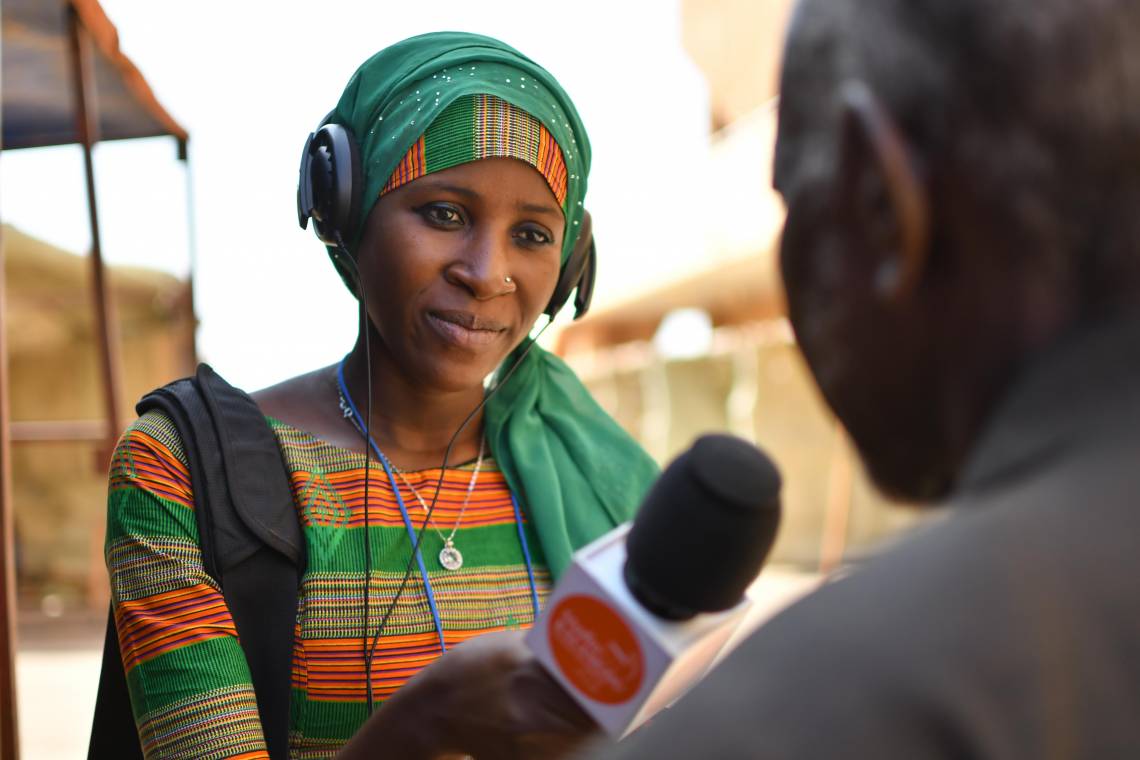Based on 23 years of Fondation Hirondelle's experience, CEO Caroline Vuillemin analyses what is at stake with regard to journalistic production in conflict or crisis countries. An interview conducted for the first issue of "Mediation", our new biannual publication.
Fondation Hirondelle has been providing information for 23 years to populations facing crises. What do you think are the most important issues in these contexts?
What is most often lacking in these societies faced with major crises is reliable information, that is information which can be a reference point for everyone to take decisions in their lives when all the other institutions are weak or destroyed. So this reliable information needs to be produced, because it rarely exists despite the growing resources put into digital information access, and because it helps to rebuild the trust that these societies need. In conflict societies, the media sector tends to be fragile, fragmented and polarized like the country itself. In this context, we try to meet the information needs, while paying attention to two constraints: the need to ensure the security of the journalists, sources and all participants in our media programmes; and the need to ensure the necessary journalistic and technical skills of the people we work with.
To meet these needs and challenges, what are Fondation Hirondelle’s working principles?
To ensure accessibility and balance, we work in the languages of the country, with local journalists who reflect the diversity of the countries where we work. As well as factual coverage of the news, we produce debate programmes, where a journalist facilitates a live dialogue between different actors - government, opposition, NGOs and other stakeholders, who have few other opportunities to talk to each other in an environment of trust. I would call our approach “responsible journalism”. Our first concern remains to
verify the information, because in conflict zones the reliability of information can be a question of life or death. We pay close attention to the way we broadcast information about violence and armed conflicts: rather than deliver it raw, we organize a dialogue around the issues with a diversity of guests who are representative of the country’s social and political components, which helps to calm the worrying or divisive effect that such information can have on the listeners.
Do you think this “responsible journalism” should go beyond strict coverage of the news so as to help people act to overcome the crises they are facing?
I am convinced that as well as establishing the facts, the role of journalism is to increase knowledge and everyone’s means of understanding, so as to allow them to act. That is not exclusive to countries in conflict or crisis. In these contexts, on the other hand, the journalism that we practice accompanies the listeners in the form of a reassuring human presence. In the Central African Republic we hear people say: “Radio Ndeke Luka is our friend”. We make it our business to give everyone a voice, notably silent majorities such as women and young people, who are often excluded from the circles of power, and religious or ethnic minorities that are under-represented in the institutions. For example, a project that we are launching in the second half of 2018 in the Rohingya refugee camps in Bangladesh aims to support these traumatized and uprooted communities by giving them both practical information to help them in their daily lives and cultural programmes that can help them relieve their suffering and share their situation, their story with other members of community. Wherever a crisis has torn a society apart, journalism can help rebuild social ties.
You can download here the first issue of "Mediation", Fondation Hirondelle's new biannual publication.
Fondation Hirondelle +41 21 654 20 20
Blog
 ©Anne Mimault / Fondation Hirondelle
A journalist from Studio Kalangou, Fondation Hirondelle's information program in Niger, reporting in the streets of Niamey.
©Anne Mimault / Fondation Hirondelle
A journalist from Studio Kalangou, Fondation Hirondelle's information program in Niger, reporting in the streets of Niamey.
“In a society in crisis, journalism can rebuild links”
Copyright © 2023 Fondation Hirondelle. All Rights Reserved.



